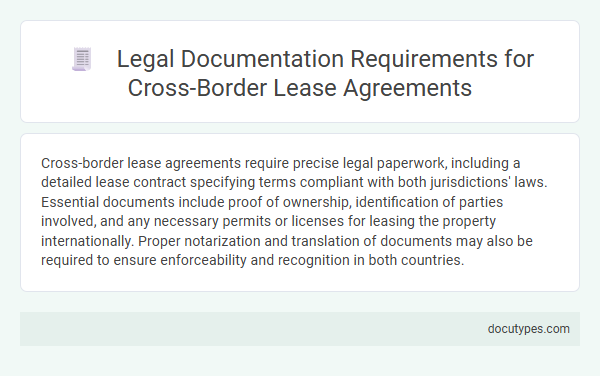Cross-border lease agreements require precise legal paperwork, including a detailed lease contract specifying terms compliant with both jurisdictions' laws. Essential documents include proof of ownership, identification of parties involved, and any necessary permits or licenses for leasing the property internationally. Proper notarization and translation of documents may also be required to ensure enforceability and recognition in both countries.
Introduction to Cross-Border Lease Agreements
Cross-border lease agreements involve leasing assets or property between parties located in different countries. These agreements require careful consideration of international laws and regulatory compliance to ensure enforceability.
- Jurisdiction Clauses - Specify the legal jurisdiction governing the lease to avoid disputes.
- Compliance Documentation - Include necessary permits, licenses, and regulatory approvals relevant to each country involved.
- Taxation Papers - Address tax obligations and documentation to comply with cross-border tax laws and treaties.
Thorough legal paperwork is essential to mitigate risks and ensure smooth execution of cross-border lease agreements.
Essential Legal Documentation for International Leasing
Cross-border lease agreements require comprehensive legal paperwork to ensure compliance with international laws and protect all parties involved. Essential documents include the lease contract, proof of ownership, and international compliance certificates.
Your lease agreement must clearly outline terms, payment schedules, and dispute resolution mechanisms in accordance with both jurisdictions. Additional paperwork may involve customs declarations and tax forms relevant to the countries involved in the lease transaction.
Jurisdiction and Governing Law Provisions
| Aspect | Details |
|---|---|
| Jurisdiction Clause | Specifies which country's courts have the authority to resolve disputes arising from the lease agreement. Essential to avoid ambiguity and conflicting legal interpretations between different national legal systems. |
| Governing Law Provision | Determines the legal framework and statutes that apply to the interpretation and enforcement of the lease contract. This legal framework affects rights, obligations, and remedies available to parties involved in a cross-border lease. |
| Importance of Clear Definition | Clarity in jurisdiction and governing law clauses reduces litigation risks and ensures predictability in legal proceedings. It facilitates smoother dispute resolution mechanisms for international lessors and lessees. |
| Additional Legal Paperwork | May include notarized copies, translations, and certificates of authenticity to comply with local legal requirements in involved jurisdictions. |
| Legal Compliance | Cross-border lease agreements must conform to laws in both the lessor's and lessee's jurisdictions, often requiring consultation with legal professionals specialized in international leasing law. |
Mandatory Regulatory Compliance and Approvals
Cross-border lease agreements require strict adherence to mandatory regulatory compliance to ensure legality across jurisdictions. Essential documentation includes lease contracts, tax identification records, and proof of compliance with local leasing laws.
Obtaining necessary approvals often involves securing permits from regulatory authorities and certifications confirming adherence to international trade and leasing regulations. Failure to acquire these approvals can result in penalties and invalidate the lease agreement.
Language and Translation Requirements
What language and translation requirements must be met for cross-border lease agreements? Cross-border lease agreements often require official translations to ensure all parties clearly understand the contract terms. You should verify the need for certified translations or notarized documents based on the jurisdictions involved.
Identification and Verification of Parties
Cross-border lease agreements require thorough identification and verification of all parties involved to ensure legal validity and enforceability. Parties must provide government-issued identification, such as passports or national ID cards, alongside proof of address to establish their identity and residency. Notarized documents and certified translations may be required to authenticate these identities across different jurisdictions.
Key Clauses in Cross-Border Lease Contracts
Cross-border lease agreements require comprehensive legal paperwork including the lease contract, proof of property ownership, and compliance certificates from relevant jurisdictions. Key clauses must address governing law, dispute resolution mechanisms, currency and payment terms, and tax obligations to ensure clarity and enforceability across borders. Your contract should also specify termination conditions, maintenance responsibilities, and cross-border regulatory compliance to mitigate risks effectively.
Execution, Authentication, and Notarization Standards
Cross-border lease agreements require meticulous legal paperwork to ensure validity and enforceability across jurisdictions. Execution, authentication, and notarization standards play a crucial role in meeting international legal requirements.
- Execution of Lease Agreement - The lease contract must be properly signed by authorized representatives of all parties involved, adhering to the formalities prescribed by the governing law.
- Authentication Requirements - Documents often require consular legalization or apostille certification to verify their legitimacy for use in foreign countries.
- Notarization Standards - Notarization by a licensed notary public confirms the identity of signatories and prevents fraud, complying with both local and international standards.
Taxation and Duty Documentation
Cross-border lease agreements require meticulous attention to taxation and duty documentation to ensure compliance with international regulations. Proper legal paperwork safeguards against fiscal penalties and facilitates smooth cross-border transactions.
- Tax Identification Numbers (TINs) - Both parties must provide valid TINs to establish tax liability and reporting requirements in their respective jurisdictions.
- Customs Duty Declarations - Accurate customs paperwork is essential for leased goods crossing borders to determine applicable import/export duties and exemptions.
- Value Added Tax (VAT) Documentation - Documentation specifying VAT obligations, including payment or exemption certificates, is necessary to avoid double taxation on leased assets.
What Legal Paperwork Is Needed for Cross-Border Lease Agreements? Infographic

